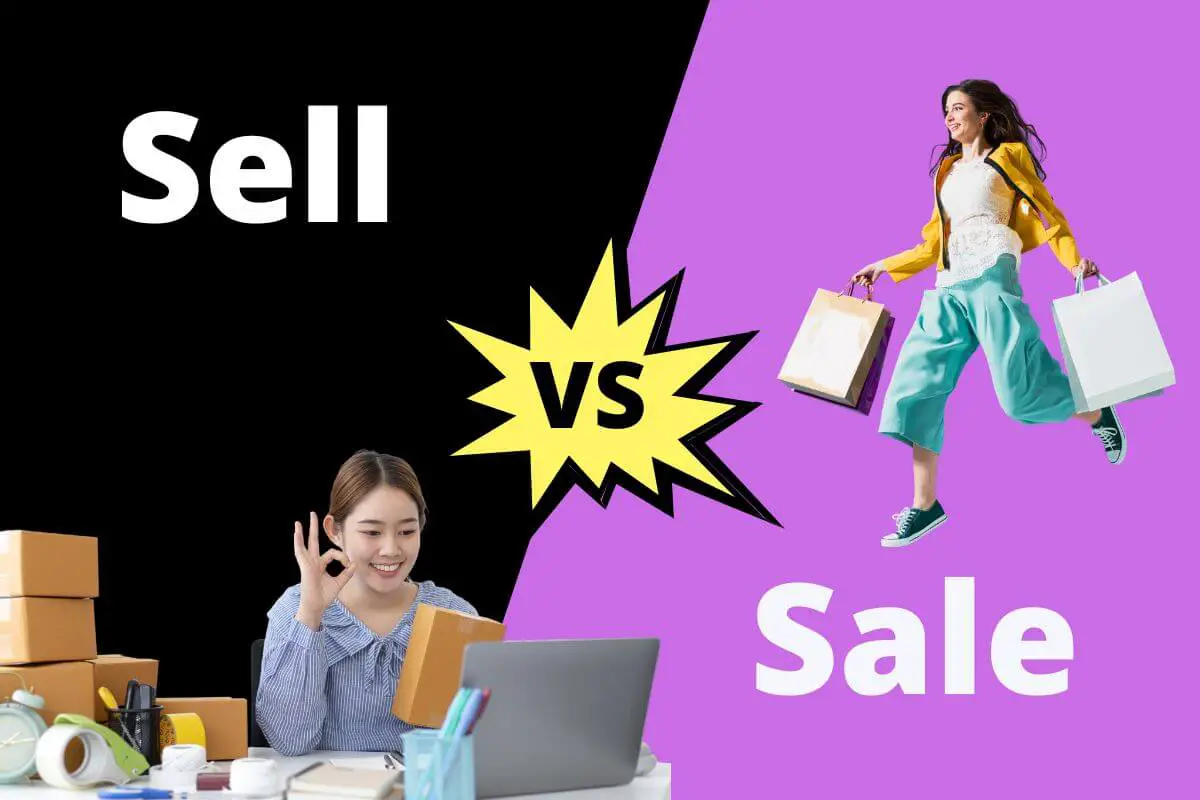Sell is a verb, sale is a noun, and both represent the exchange of goods. Both words represent the same meaning, but the difference lies in the function of the terms or parts of speech.
While saying the wrong word may not impact conversations, writing the wrong word may leave a wrong impression.
Table of Contents
Sale vs Sell
| Sell | vs | Sale |
| Verb form | Part of speech | Noun form |
| Sold | Past tense | N/A |
| Act of selling something in exchange for money. The selling price means the actual price of a product. | Definition | Refers to a period when certain items or services are available at reduced prices. The sale price means the discounted price. |
| Required | Conjugation | Not required |
What Does Sell Mean?
Sell is a verb that means the exchange of goods or transfer of service. Selling means giving up a piece of property or anything that belongs to you in exchange for money. Plus, sell is a verb, so it requires conjugation.
Example
I sell. He sells. They sell.
Metaphorical Example
The verb is not only used in the literal sense but metaphorical senses as well.
She really has to sell that idea to get our manager on board.
Don’t sell your soul just to get a higher paycheck.
Practical Examples
I want to sell my car.
He may sell his bike to you if you quote the right price.

What Does Sale Mean?
Sale is the noun form of the verb sell. The definition of a sale is similar to the definition of sell. It is the act of selling something in exchange for money. A sale is the noun form, and it is not conjugated.
The sale also means a specific period or occasion where companies, brands, or manufacturers sell their products or services at reduced prices. You must have seen those ads or posters saying clearance sale, mega sale, holiday sale, mega sale, etc.

Difference Between Sell And Sale
Form
Sell is the verb form, and we use sell to mean any exchange of goods. In contrast, the word sale is the noun form of the verb but has almost the same meaning.
Difference of Use
As these are the different forms of the same word, their usage will also vary. Sale is more prominently used to mean an event or occasion where brands sell their product at discount prices.
Common Sale Examples
- Flight tickets are on sale from 5th to 8th August.
- My company generated more sales this year than last year.
- I work in the sales department.
- The items on sale are non-refundable.
- All products in that store are on sale.
- This house is not for sale.
Common Sell Examples
- That store sells all types of grocery items
- Do you want to sell your house?
- If you want to sell your bike, you must get it repaired first.
- Any liquor store needs to have a license to sell alcohol.
- Do you want to sell your car?
- I sell insurance packages for a living.
Examples
- She wants to sell her jewelry
- I had to sell my car to pay my debts
- This store does not sell fruits
- All Adidas products are on sale
- My house is for sale
- I saw a sale advertisement today
- The sale of alcohol is barred inside the university premises
Common Mistakes People Make While Using Sell And Sale
Some common mistakes people make while using sell and sale in their sentences. If you want to avoid these mistakes, check out the following examples.
| Correct | Incorrect |
| I want to sell my car. | I want to sale my car. |
| There is a sale going on at the mall. | There is sell going on at the mall. |
| Make a sale. | Make a sell. |
| I got these shoes on sale. | I got these shoes on sell. |
| We are going to sell our family property. | We are going to sale our family property. |
| I would never sell dignity. | I would never sale my dignity. |
| Have you ever been to a Black Friday sale? | Have you ever been to a Black Friday sell? |
| Are you making a sales call? | Are you making a sells call? |
| I’m hosting a garage sale to get rid of excess stuff. | I’m hosting a garage sell to get rid of excess stuff. |
| People love to buy products on sale. | People love to buy products on sell. |
| He is a salesperson. | He is a sellsperson. |
| He made a sale to the customer. | He made a sell to the customer. |
If you enjoyed this article, check out our post comparing to versus too.

